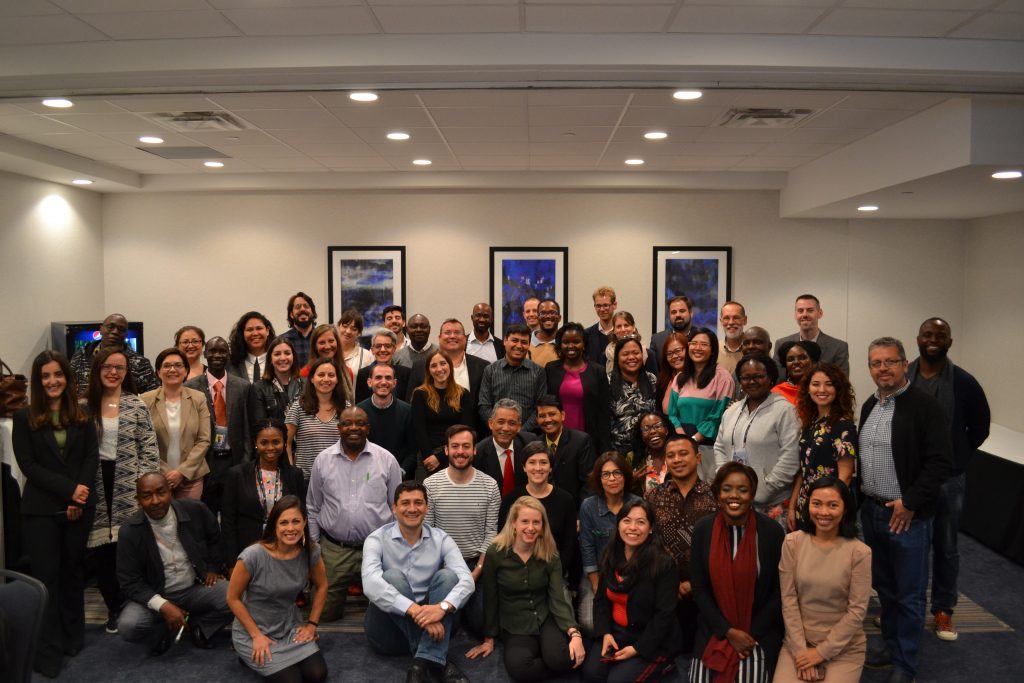Five Frequently Asked Questions about Implementing Local Public Procurement Processes
5 preguntas frecuentes sobre la implementación de procesos locales de compras públicas
One of the advantages of a local open contracting initiative is the proximity of a government to the people that it serves – it allows for easier public participation in governance. Of late, local governments who have started initiatives to make their processes to procure goods and services more efficient and accountable have come together with non-government actors in the Local Open Contracting Initiative (LOCI) – a global linking and learning mechanism coordinated by the international NGO Hivos and its partners.
What are some of the frequently asked questions that local governments and civil society have when considering designing and implementing such initiatives? Katria Tomko of Hivos’ Open up Contracting Program answers a few.
What is open contractingA transparent procurement process, known as open contracting, increases competition, improves public service delivery, and ensures governments better value for their money. Technical specifications: C... More?
Every year, governments spend immense amounts of money on public contracting (also known as public procurementTransparency in the procurement process can help combat corruption and waste that plagues a significant portion of public procurement budgets globally. Technical specifications: Commitments that aim t... More) processes. To ‘open contracting’ is to make public contracting processes more open, inclusive, and responsive to the needs of people and to make data and documents in these procurement processes available to inform debate and decision making. In doing this, governments can save taxPlacing transparency, accountability, and participation at the center of tax policy can ensure that burdens are distributed equitably across society. Technical specifications: Commitments related to c... money, make better use of public resources, deliver better public goods and services, boost integrity, and prevent fraud and corruption. Publishing this data is a necessary first step, but it’s not the last. Informed citizens need to be able to access and make sense of this data to provide feedback. Only then will this open dataBy opening up data and making it sharable and reusable, governments can enable informed debate, better decision making, and the development of innovative new services. Technical specifications: Polici... unlock opportunities for improvement in the procurement system.
Read on to learn more about open contracting.

Is there a specific formula for implementing a local open contracting initiative?
There are several steps you can take as a civil servant to best design and implement a local open contracting initiative:
- Understand the current legal framework, organizational setup, and public contracting process in your sub-nationalRecognizing that much of what impacts people’s daily lives occurs at the local level, many OGP countries are working to open up lower levels of government by creating commitments focused on subnatio... or city government.
- Discuss open contracting concepts with relevant stakeholders, agree on goals, and set pathways for how to realize them.
- Map and publish available public contracting data and documents from all phases of the public procurement cycle by following the Open Contracting Partnership’s OCDS implementation guide.
- Aggregate the data into a single platform that allows for monitoring and analysis, which, in turn, facilitates smarter and more efficient delivery of public goods and services.
- Ensure your legislative and policy framework supports reforms that will reach and understand all stakeholders and their needs, thereby making the entire public contracting cycle more efficient, transparent, and accountable.
- Realize open contracting is a process that requires changing mindsets and long term commitments from everyone. Managing this change process is as important as policy reform and data disclosure.
More help on getting started and an open contracting journey in 7 steps.
Can a local initiative make a big difference when a national initiative is already in play?
Of course! Local and national contexts have significantly different needs. Not to mention, bottom-up initiatives can influence national-level processes. Both local and national initiatives benefit from exchange and integration.
LOCI, mentioned earlier, is a pilot where local initiatives learn from each other to find out what works and what doesn’t. Participants learn how to move from ad hoc engagement with national governments and civil society toward strategic engagement. Ensuring that changes are demand-driven is key to the implementation and sustainability of new contracting reform processes. Determining demand becomes easier when local governments start a dialogue and work in tandem with civil society and the business sector. Direct and honest delivery of public service can then take place and lead to accountable and inclusive local governance.
Learn more about LOCI’s learning approach here!
Is it beneficial for a local government to disclosure procurement data? And is it safe?
Disclosing your data is a gateway to opportunity. For a government, the data contains information that can be used to produce better analytics. With better analytics, procedures can be improved to facilitate smarter government deal-making – that means potentially huge returns on investments! Disclosed data also promotes fairer deal-making by building trust between the government and other actors. Businesses and civil society organizations are empowered to provide feedback on the procurement process based on insights and evidence from analyzing open procurement data, which, in turn, promotes integrity across government sectors.
And, yes, it is safe! Government contracting documents can be published without compromising personal privacy or commercial confidentiality. If information is legitimately sensitive, a clear case should be made as to how and why disclosure would cause harm – any redactions should be minimal. Anonymizing or aggregating certain personal data to make it non-identifiable can also assuage concerns.
More doubts about open contracting addressed here and here!

How can you make sure that disclosed data is used?
Opening up procurement data is the first step towards meaningful change. The data needs to be relevant and comprehensible to the people who would benefit from inclusive participation in the procurement process. In Guatemala, for example, HIV/AIDS rights activists linked up with the civic tech community to unlock procurement data on HIV medicine. Together, they worked towards a more open and equitable drug procurement process for people living with HIV. Identifying potential for such collaborative projects is key to ensuring the longevity and sustainability of responses to societal crises, such as the HIV/AIDS epidemic.
Learn how to make sure open contracting data gets used here and here!
Don’t hesitate to get in touch if you are interested in learning more about LOCI!
Una de las ventajas de las iniciativas de contratación abierta a nivel local es la cercanía que existe entre el gobierno y sus ciudadanos, pues permite una mayor participación de las personas en la gobernanza. Recientemente, los gobiernos locales que han implementado iniciativas para aumentar la eficiencia y la rendición de cuentas de sus procesos de compra de bienes y servicios se incorporaron a la Iniciativa de Contrataciones Abiertas Locales (LOCI por sus siglas en inglés), mecanismo global de vinculación y aprendizaje coordinada por la ONG internacional Hivos y sus socios.
Katria Tomko del Programa de Contratación Abierta de Hivos nos responde algunas de las preguntas que los gobiernos locales y la sociedad civil frecuentemente se plantean cuando inician sus procesos de desarrollo e implementación de dichas iniciativas.
- ¿Qué es la contratación abierta?
Cada año, los gobiernos gastan cantidades enormes de dinero en procesos de contrataciones públicas (compras públicas). La contratación abierta implica que los procesos de contratación púbica son más abiertos e incluyentes, que responden a las necesidades de los ciudadanos y que los datos y documentos asociados a dichos procesos están disponibles para usar mejorar la toma de decisiones. Así, los gobiernos pueden ahorrar recursos fiscales, utilizar los recursos públicos de mejor manera, ofrecer mejores bienes y servicios a sus ciudadanos, fortalecer su integridad y evitar casos de fraudes o corrupción. La publicación de datos es un primer paso necesario, pero no es el único. Es necesario que los ciudadanos tengan acceso a los datos publicados y que comprendan sus implicaciones, de manera que puedan poder dar su retroalimentación. Solo así lograremos que los datos abiertos generen oportunidades para mejorar los sistemas de compras públicas.
Haz clic aquí para mayor información sobre la contratación abierta.

- ¿Existe una fórmula específica para la implementación de iniciativas locales de contratación abierta?
Existen varios pasos que, como funcionario, puedes tomar para diseñar e implementar iniciativas de locales de contratación abierta:
- Conocer el marco legal, la estructura organizacional y el proceso de contrataciones públicas de tu gobierno subnacional o local.
- Discutir temas de contratación abierta con los actores relevantes, definir objetivos comunes y establecer estrategias para cumplirlos.
- Mapear y publicar los datos y documentos de contratación abierta que se encuentren disponibles de todas las fases del ciclo de procuración pública, siguiendo la guía de implementación de Open Contracting Partnership.
- Reunir todos los datos en una sola plataforma que permita monitorear y analizarlos y, así, facilitar una provisión de bienes y servicios públicos más eficiente.
- Asegurar que el marco legislativo y de política permita establecer reformas que beneficien a todos los actores, aumentando la eficiencia, transparencia y rendición de cuentas de todo el ciclo de contratación pública.
- Comprender que la contratación abierta es un proceso que requiere de un cambio en la mentalidad y de compromisos de largo plazo de todos los actores. El manejo de este proceso es tan importante como las reformas de política y la publicación de datos.
Mayor información sobre cómo empezar y un recorrido por la contratación abierta en 7 días.
- Si una iniciativa ya se encuentra en curso a nivel nacional, ¿una iniciativa a nivel local puede hacer la diferencia?
¡Claro que sí! Los contextos nacionales y locales tienen necesidades muy diferentes. Además, las iniciativas de abajo hacia arriba pueden influir en los procesos nacionales. Un proceso de intercambio de experiencias podría beneficiar tanto a las iniciativas nacionales como a las locales.
La iniciativa LOCI es un proyecto piloto en el que las iniciativas locales intercambian lecciones aprendidas sobre las medidas que funcionan y las que no. Los participantes aprenden a avanzar de una vinculación con los gobiernos nacionales y con la sociedad civil ad hoc hacia una vinculación estratégica. Asegurar que los cambios respondan a la demanda es clave para la implementación y la sostenibilidad de los procesos de reformas de contratación. Definir la demanda es más fácil cuando los gobiernos locales dialogan y trabajan en conjunto con la sociedad civil y el sector privado. Así, la provisión de servicios públicos puede ser directa y honesta y la gobernanza local puede ser incluyente y rendir cuentas.
Conoce más sobre la estrategia de aprendizaje de LOCI aquí.
- ¿Es conveniente para los gobiernos locales publicar sus datos de procuración? ¿Es seguro?
Publicar tus datos es dar entrada a oportunidades. Para los gobiernos, los datos contienen información que puede ser utilizada para generar análisis de mayor calidad. Cuando se cuenta con mejores análisis, los procedimientos se pueden mejorar para hacer mejores contratos, es decir enormes retornos a la inversión. Además, la publicación de datos promueve la creación de contratos más justos al fortalecer la confianza entre el gobierno y otros actores. Las empresas y organizaciones de la sociedad civil se empoderan para retroalimentar el proceso de procuración con base en las evidencias resultantes de los análisis de procuración de datos abiertos y, a su vez, promover la integridad entre los sectores de gobierno.
Y sí, ¡es seguro! Los documentos de contratación de los gobiernos pueden ser publicados sin comprometer la privacidad personal o la confidencialidad comercial. Si la información es realmente sensible, debe demostrarse claramente de qué forma su publicación causaría daño y la información no publicada debe ser mínima. Otra forma de minimizar este riesgo es publicar datos de forma anónima o agregar los datos personales.
Para resolver más dudas sobre contratación abierta haz clic aquí y aquí.

- ¿Cómo puedes asegurar que los datos publicados se utilicen?
La apertura en los datos de procuración es el primer paso hacia un cambio significativo. Los datos tienen que ser relevantes y de fácil comprensión para las personas que se beneficiarán de la participación incluyente en el proceso de compras. Por ejemplo, en Guatemala, un grupo de activistas de VIH/SIDA trabajaron con la comunidad cívica de la tecnología para tener acceso a datos de compras de medicamento para el VIH. Juntos trabajaron hacia un proceso de compras de medicamentos más abierto y equitativo para las personas que viven con VIH. Identificar el potencial de este tipo de proyectos colaborativos es clave para asegurar la longevidad y la sostenibilidad de las crisis sociales, como el caso de la epidemia de VIH/SIDA.
Para saber más sobre cómo se han utilizado los datos de contratación abierta, haz clic aquí y aquí.
Si te interesa saber más sobre LOCI, no dudes en ponerte en contacto.
No comments yet
Related Content
 Challenges and Solutions
Challenges and Solutions On the Road to a Better Procurement System in South Cotabato
The local government of South Cotabato, a province in the south of the Philippines, only completed 4.1 per cent of the development projects - most of them related to infrastructure…



Leave a Reply